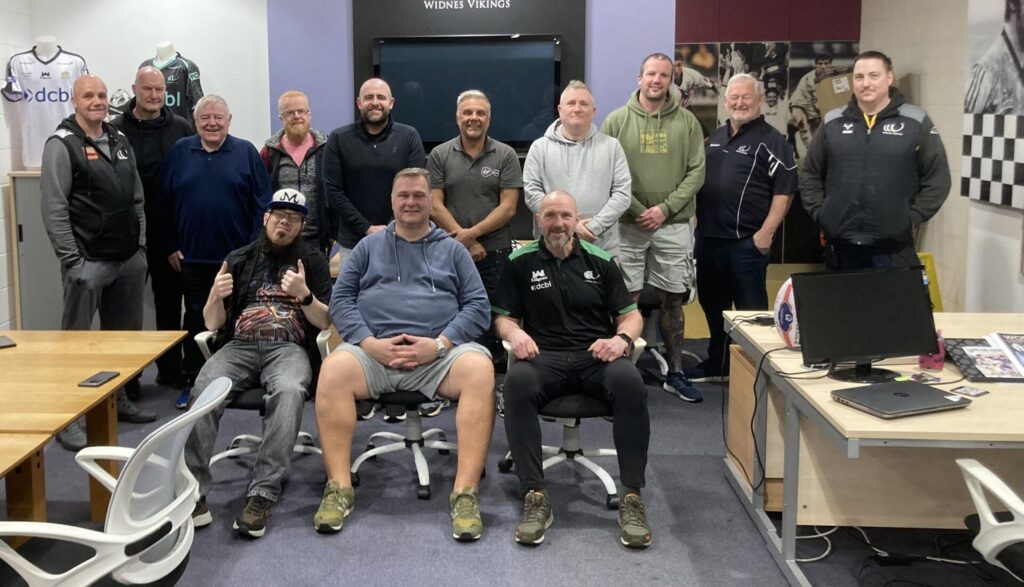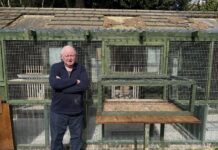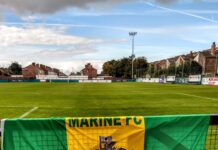The figures released by the Office for National Statistics tell their own story. They give the heading: ‘Intentional self-harm and event of undetermined intent’, but we all know what that really means. The thing that kills more men under 50 than anything else is themselves.

One of them was Great Britain and Wigan Warriors rugby league star Terry Newton, who died in 2010. Yet from the tragedy comes a beacon of positivity, togetherness and community – State of Mind Sport.
State of Mind was co-founded by former Mersey Care Suicide Prevention Lead Dr. Phil Cooper MBE and is now into its thirteenth year. Its mission statement is to promote positive mental health through a variety of means. This includes ‘Extra Time’ sessions, which run every Tuesday evening in partnership with Widnes Vikings RLFC. The sessions are designed to be a safe space for men to discuss their mental health and boost their mental fitness. They are run by State of Mind trustee Ste Cash. Ste explains why he believes the discussions are so important:
“Normalising it, or making it a normal conversation and teaching people the way to go about it, removing the stigma – that it’s actually okay to talk. I’d rather talk with someone than attend their funeral. I’d rather someone came to me and said, ‘I’ve got a problem.’”
Just before 6.30 pm the participants file in and greet one another. There is a hubbub consisting of good-natured chat, which is occasionally punctuated by the clink of teaspoon on ceramic. Laughter is frequent and friendly barbs are exchanged.
Need a safe space to talk and boost your mental fitness?
Men can come along to tonight's Extra Time session at @WidnesRL's DCBL Stadium from 6:30pm 🖤🧠
🤝 Kindly supported by @Zer0Suicide & @Mersey_Care pic.twitter.com/PDIdQKfMmc
— State of Mind (@stateofmindsprt) February 20, 2024
Tonight’s speaker is Wayne, who has told his story here before. His focus alcohol abuse is related to the the deterioration of his mental health, which culminated in him tying a noose to the rafters of his garage. Inside the garage sat his sister’s parked car. Wayne recalls how, a few years before, she fought so hard to cling on to life before eventually succumbing to cancer. It was the presence of that car, Wayne says, which made him cling on to his own life.
Several of the participants detail their own relationship with alcohol. Although a seriousness illness it is not long before smiles and laughter return. “Dry January? Only if it’s dry gin and dry cider!” blurts out one of the lads. This is one of the reasons behind the success of the scheme – difficult topics are discussed with humour – and crucially – without judgement.
This sentiment is echoed by Karl, who contributes frequently during the session. He said:
“It was a bit daunting coming through, but I’m a talkative lad, so when I came here it just seemed right. All the lads are great. Nobody judges anybody.
“If you want to talk, you can talk. If you don’t, you don’t have to. I’ve made good mates now. If you don’t seem yourself – the lads will phone you.”
It is clear that the sessions have brought the participants together. No one escapes being the butt of a joke if needs be, the unmistakeable signs of male bonding. Things like: “Happy birthday for the other day – you don’t look a day over 70!” Some of the chat is reminiscent of the pub or a family barbecue.
Karl spells it out: “For me, probably the best thing that I’ve done is coming here, because I’d never have met these lads anywhere else.
“When you hear some of the lads’ stories – every one of us is real. We’ve all been through something, but we’ve got this as our ‘common denominator,’ as it says in maths.
“It just seems right. It’s very good. A brilliant place.”
The sessions have helped Karl change a lifetime of potentially destructive behaviours. He is a former fighter for whom some old habits die hard – his feet unconsciously position themselves in a perfect boxer’s stance as he talks. He reflects on the changes in his outlook:
“Whenever anybody told me I had a problem, or that I needed to seek advice about my mental health, I found that as an attack against me.
“Because I’m a fighter, that would be the thing for me to stand my ground and argue with. I would argue the fact that there’s nothing wrong with me, until one day, I realised that there was.”
Supporting @stateofmindsprt in Asia, taking time to relax and notice and explore nature all around me https://t.co/AclrRvvorl pic.twitter.com/6x1rJUlxS8
— Dr. Phil Cooper MBE (@wirephil) February 13, 2024
State of Mind founder Dr. Cooper is a rugby league fanatic – many of their events are run in conjunction with clubs across the country. Tuesday’s meeting is no exception, taking place beneath a stand usually filled with roaring Vikings fans on Sunday afternoons. The charity ‘harnesses the power of sport’ to help achieve its aims. Session leader Ste Cash is an advocate for this sporting influence. He said:
“I think all clubs should use their fan base – or the ‘hook’ of the fan base – to engage with the fans on mental health.
“More clubs should do it on a wider base. The hook is the club – whether it’s Liverpool, Everton, Widnes, whatever – there’s a fan base there. They should engage with that fan base and promote mental health within it.”

There is just time for the customary group photo before the participants file out and say their goodbyes. The vast majority will be back next week, and the weeks after that. They will be needing a bigger room soon, thinks Sean Mellor, who runs the sessions alongside Ste.
He may well be right. Karl can explain why:
“I said to my girlfriend the other day, ‘I can’t remember who I was’ – because my mental health had been bad for that long. This place helps amazingly. These other lads would tell you the same.”
_______________________________________________________________________
Surnames of participants omitted to protect identities.

















